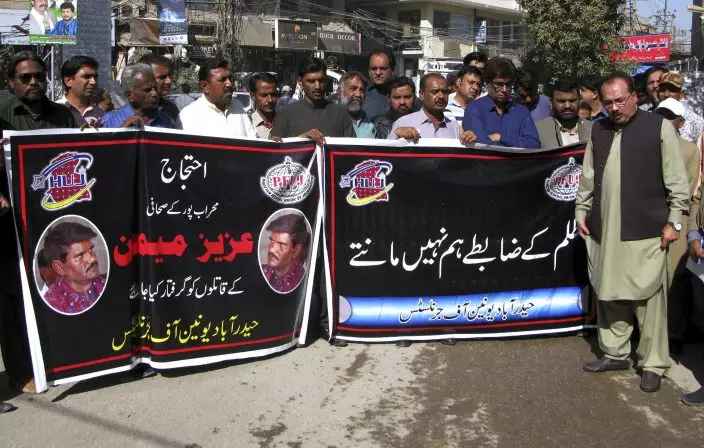The body of a slain Pakistani journalist was found dumped in a canal just hours after he went missing while on his way to work, police said Monday. His family said he was brutally killed but that they have no idea who was behind the slaying.
The 56-year-old Aziz Memon had worked as a reporter and cameraman for a local TV station in southwestern Sindh province. He went missing while going to work on Sunday.
Police chief Mohammad Farooq said the body was found in a canal in Mehrabpur village and that an investigation was under way. No one immediately claimed responsibility for the abduction and killing of Memon.

Journalists hold a banner that says, in part, 'immediately arrest the killers of journalist Aziz Memon," during a demonstration to condemn his killing, in Hyderabad, Pakistan, Monday, Feb. 17, 2020. The body of Memon was found dumped in a canal just hours after he went missing while on his way to work, police said Monday. His family said he was brutally killed but that they have no idea who was behind the slaying. (AP PhotoPervez Masih)
His brother, Abdul Hafeez, said Memon had received threats last year after reporting that a politician from the area had paid bribe money to locals to attend an opposition rally.
Later Monday, angered over Memon's killing, journalists from various newspapers and TV stations held a peaceful protest in the southern city of Hyderabad, condemning the killing and demanding the arrest of those behind it.
Memon's killing also drew condemnation by rights activists on social media. An old posting of Memon also surfaced in which he says he received threats after covering a rally of Bilawal Bhutto Zardari, who heads the opposition Pakistan People's Party. A statement from Zardari also condemned the killing, demanding Memon's killers be arrested as soon as possible.
The International Federation of Journalists and its affiliate, the Pakistan Federal Union of Journalists, have asked the government to investigate.
Anthony Bellanger, IFJ's general secretary, said the organization “mourns the shocking death of journalist Aziz Memon" and criticized the police for not following through on the threats he had reported.
Pakistan is considered a dangerous place for journalists and those involved in attacks on journalists are rarely punished. The country has also witnessed an intensified crackdown on human rights defenders, activists, journalists and members of civil society over the past years.
Journalists, who have taken on military dictators and been beaten and jailed in the pursuit of a free press, say they now face a form of censorship that is more subtle but no less chilling, spearheaded by the security services, to quash critical coverage.


